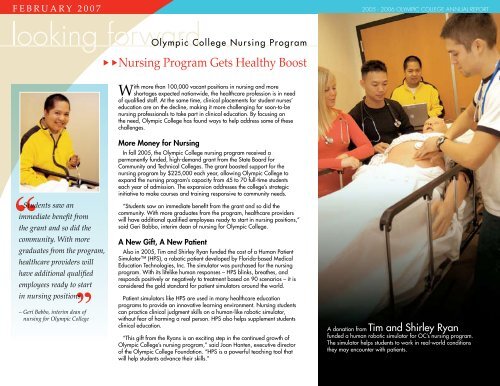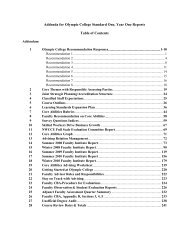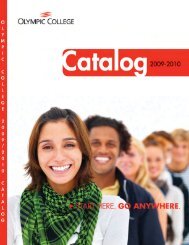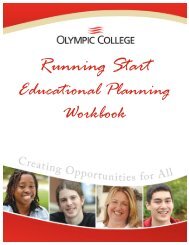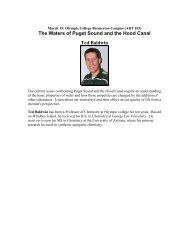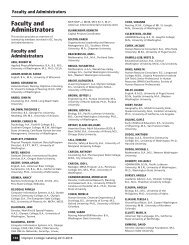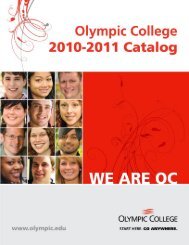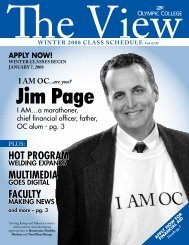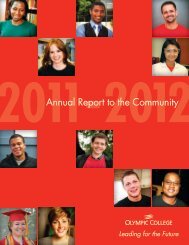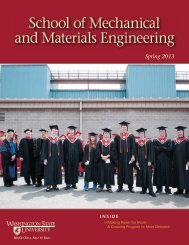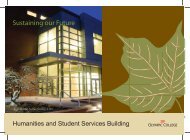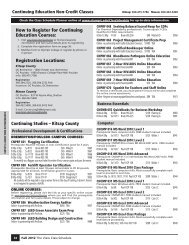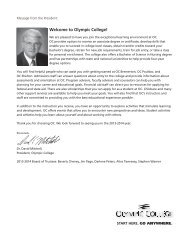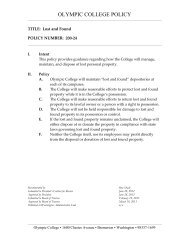2005-2006 Olympic College Annual Report
2005-2006 Olympic College Annual Report
2005-2006 Olympic College Annual Report
Create successful ePaper yourself
Turn your PDF publications into a flip-book with our unique Google optimized e-Paper software.
FEBRUARY 2007<br />
<strong>2005</strong> - <strong>2006</strong> OLYMPIC COLLEGE ANNUAL REPORT<br />
<strong>Olympic</strong> <strong>College</strong> Nursing Program<br />
Nursing Program Gets Healthy Boost<br />
Students saw an<br />
immediate benefit from<br />
the grant and so did the<br />
community. With more<br />
graduates from the program,<br />
healthcare providers will<br />
have additional qualified<br />
employees ready to start<br />
in nursing positions.<br />
– Geri Babbo, interim dean of<br />
nursing for <strong>Olympic</strong> <strong>College</strong><br />
With more than 100,000 vacant positions in nursing and more<br />
shortages expected nationwide, the healthcare profession is in need<br />
of qualified staff. At the same time, clinical placements for student nurses’<br />
education are on the decline, making it more challenging for soon-to-be<br />
nursing professionals to take part in clinical education. By focusing on<br />
the need, <strong>Olympic</strong> <strong>College</strong> has found ways to help address some of these<br />
challenges.<br />
More Money for Nursing<br />
In fall <strong>2005</strong>, the <strong>Olympic</strong> <strong>College</strong> nursing program received a<br />
permanently funded, high-demand grant from the State Board for<br />
Community and Technical <strong>College</strong>s. The grant boosted support for the<br />
nursing program by $225,000 each year, allowing <strong>Olympic</strong> <strong>College</strong> to<br />
expand the nursing program’s capacity from 45 to 70 full-time students<br />
each year of admission. The expansion addresses the college’s strategic<br />
initiative to make courses and training responsive to community needs.<br />
“Students saw an immediate benefit from the grant and so did the<br />
community. With more graduates from the program, healthcare providers<br />
will have additional qualified employees ready to start in nursing positions,”<br />
said Geri Babbo, interim dean of nursing for <strong>Olympic</strong> <strong>College</strong>.<br />
A New Gift, A New Patient<br />
Also in <strong>2005</strong>, Tim and Shirley Ryan funded the cost of a Human Patient<br />
Simulator (HPS), a robotic patient developed by Florida-based Medical<br />
Education Technologies, Inc. The simulator was purchased for the nursing<br />
program. With its lifelike human responses – HPS blinks, breathes, and<br />
responds positively or negatively to treatment based on 90 scenarios – it is<br />
considered the gold standard for patient simulators around the world.<br />
Patient simulators like HPS are used in many healthcare education<br />
programs to provide an innovative learning environment. Nursing students<br />
can practice clinical judgment skills on a human-like robotic simulator,<br />
without fear of harming a real person. HPS also helps supplement students<br />
clinical education.<br />
“This gift from the Ryans is an exciting step in the continued growth of<br />
<strong>Olympic</strong> <strong>College</strong>’s nursing program,” said Joan Hanten, executive director<br />
of the <strong>Olympic</strong> <strong>College</strong> Foundation. “HPS is a powerful teaching tool that<br />
will help students advance their skills.”<br />
A donation from Tim and Shirley Ryan<br />
funded a human robotic simulator for OC’s nursing program.<br />
The simulator helps students to work in real-world conditions<br />
they may encounter with patients.


